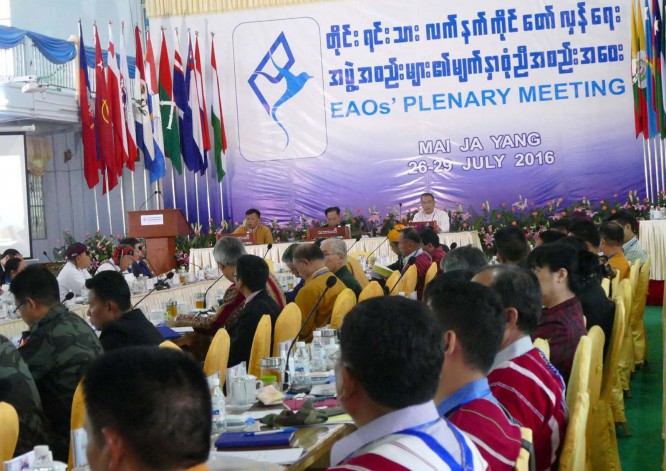Representatives of 17 ethnic armed groups on Tuesday began a plenary meeting in Maijayang, Kachin State, where they will attempt to establish common goals ahead of political dialogue with the Burmese government and military.
The event’s organising committee chairman, Khu Oo Reh of the Karenni National Progressive Party, said in his opening speech that the four-day talks would entail an agenda of four main items: discussion and endorsement of the Panglong manual; adoption of basic principles concerning a federal democratic union; adoption of basic principles regarding security and defence; and amendment of the framework for political dialogue, which is due to kick off at the end of next month – negotiations that the government’s de facto leader Aung San Suu Kyi has dubbed the 21st Century Panglong Conference, or 21CPC.
The Karenni leader stressed that delegates would aim to reach mutual agreements on behalf of all ethnic armed groups that are working towards a federal system.
Gen. N’Ban La of the Kachin Independence Organisation (KIO), who is sitting as chairman of the Maijayang conference, said the meeting would strengthen unity between the respective ethnic minorities. He too stressed the importance of finding common ground on the principal issue of federalism.
“The government is working to convene the 21st Century Panglong Conference to create an environment where we can negotiate and find solutions to political problems,” he said. “And it is crucial that all the ethnic groups find common ground regarding the establishment of a federal union [in Burma].”
The 17 ethnic armed groups represented at the Maijayang talks include both signatories and non-signatories to the Nationwide Ceasefire Agreement (NCA), which was signed by eight groups and the Burmese government in October 2015. Also in attendance were members of the ethnic armed coalition United Nationalities Federal Council, or UNFC; the ethnic political party alliance Nationalities Brotherhood Federation (NBF); and the Women’s League of Burma (WLB). Foreign observers included China’s Special Envoy on Asian Affairs Sun Guoxiang, and the UN secretary-general’s special advisor to Burma, Vijay Nambiar.
Three non-ceasefire groups did not attend: United Wa State Army (UWSA); Kokang-based Myanmar National Democratic Alliance Army (MNDAA); and Ta’ang National Liberation Army (TNLA).
[related]
The TNLA’s Mong Aik Kyaw said the group decided not to attend the Maijayang to avoid causing delays to the peace process.
“There are two reasons for our non-attendance at the Maijayang talks – first, we are yet to meet with the government’s peace negotiators, and the Burmese military has said we can only get on board the peace process when we accept disarmament.
“If we were at the talks, they could be dominated by discussing whether we must disarm or not, rather than etching out a political dialogue,” said Mong Aik Kyaw.
“And secondly, the Restoration Council of Shan State (RCSS/Shan State Army-South) is in attendance. This militia has engaged us in recent and constant armed clashes. If both groups were at the Maijayang conference, we would have to face up to each other and argue our case, causing a delay in the talks.”
The Maijayang round follows four other plenary meetings in recent years – two at the Karen National Union base in Law Khee La, and two at the KIO headquarters in Laiza.
On 17 July in Naypyidaw, a senior delegation of the UNFC, led by N’Ban La, met for the first time with government representatives including State Counsellor Aung San Suu Kyi.
N’Ban La said the UNFC urged the government to support inclusivity in the peace process; to halt Burmese military offensives in northern Burma; and to appreciate the importance of reaching a political framework acceptable by all parties, which will ensure a genuine nationwide ceasefire.



